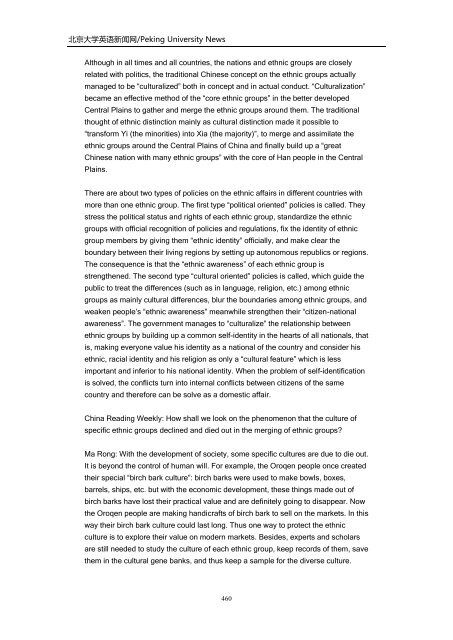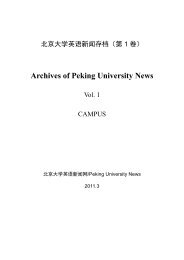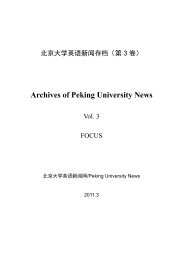Archives of Peking University News - PKU English - 北京大学
Archives of Peking University News - PKU English - 北京大学
Archives of Peking University News - PKU English - 北京大学
You also want an ePaper? Increase the reach of your titles
YUMPU automatically turns print PDFs into web optimized ePapers that Google loves.
<strong>北京大学</strong>英语新闻网/<strong>Peking</strong> <strong>University</strong> <strong>News</strong><br />
Although in all times and all countries, the nations and ethnic groups are closely<br />
related with politics, the traditional Chinese concept on the ethnic groups actually<br />
managed to be ―culturalized‖ both in concept and in actual conduct. ―Culturalization‖<br />
became an effective method <strong>of</strong> the ―core ethnic groups‖ in the better developed<br />
Central Plains to gather and merge the ethnic groups around them. The traditional<br />
thought <strong>of</strong> ethnic distinction mainly as cultural distinction made it possible to<br />
―transform Yi (the minorities) into Xia (the majority)‖, to merge and assimilate the<br />
ethnic groups around the Central Plains <strong>of</strong> China and finally build up a ―great<br />
Chinese nation with many ethnic groups‖ with the core <strong>of</strong> Han people in the Central<br />
Plains.<br />
There are about two types <strong>of</strong> policies on the ethnic affairs in different countries with<br />
more than one ethnic group. The first type ―political oriented‖ policies is called. They<br />
stress the political status and rights <strong>of</strong> each ethnic group, standardize the ethnic<br />
groups with <strong>of</strong>ficial recognition <strong>of</strong> policies and regulations, fix the identity <strong>of</strong> ethnic<br />
group members by giving them ―ethnic identity‖ <strong>of</strong>ficially, and make clear the<br />
boundary between their living regions by setting up autonomous republics or regions.<br />
The consequence is that the ―ethnic awareness‖ <strong>of</strong> each ethnic group is<br />
strengthened. The second type ―cultural oriented‖ policies is called, which guide the<br />
public to treat the differences (such as in language, religion, etc.) among ethnic<br />
groups as mainly cultural differences, blur the boundaries among ethnic groups, and<br />
weaken people‘s ―ethnic awareness‖ meanwhile strengthen their ―citizen-national<br />
awareness‖. The government manages to ―culturalize‖ the relationship between<br />
ethnic groups by building up a common self-identity in the hearts <strong>of</strong> all nationals, that<br />
is, making everyone value his identity as a national <strong>of</strong> the country and consider his<br />
ethnic, racial identity and his religion as only a ―cultural feature‖ which is less<br />
important and inferior to his national identity. When the problem <strong>of</strong> self-identification<br />
is solved, the conflicts turn into internal conflicts between citizens <strong>of</strong> the same<br />
country and therefore can be solve as a domestic affair.<br />
China Reading Weekly: How shall we look on the phenomenon that the culture <strong>of</strong><br />
specific ethnic groups declined and died out in the merging <strong>of</strong> ethnic groups?<br />
Ma Rong: With the development <strong>of</strong> society, some specific cultures are due to die out.<br />
It is beyond the control <strong>of</strong> human will. For example, the Oroqen people once created<br />
their special ―birch bark culture‖: birch barks were used to make bowls, boxes,<br />
barrels, ships, etc. but with the economic development, these things made out <strong>of</strong><br />
birch barks have lost their practical value and are definitely going to disappear. Now<br />
the Oroqen people are making handicrafts <strong>of</strong> birch bark to sell on the markets. In this<br />
way their birch bark culture could last long. Thus one way to protect the ethnic<br />
culture is to explore their value on modern markets. Besides, experts and scholars<br />
are still needed to study the culture <strong>of</strong> each ethnic group, keep records <strong>of</strong> them, save<br />
them in the cultural gene banks, and thus keep a sample for the diverse culture.<br />
460




